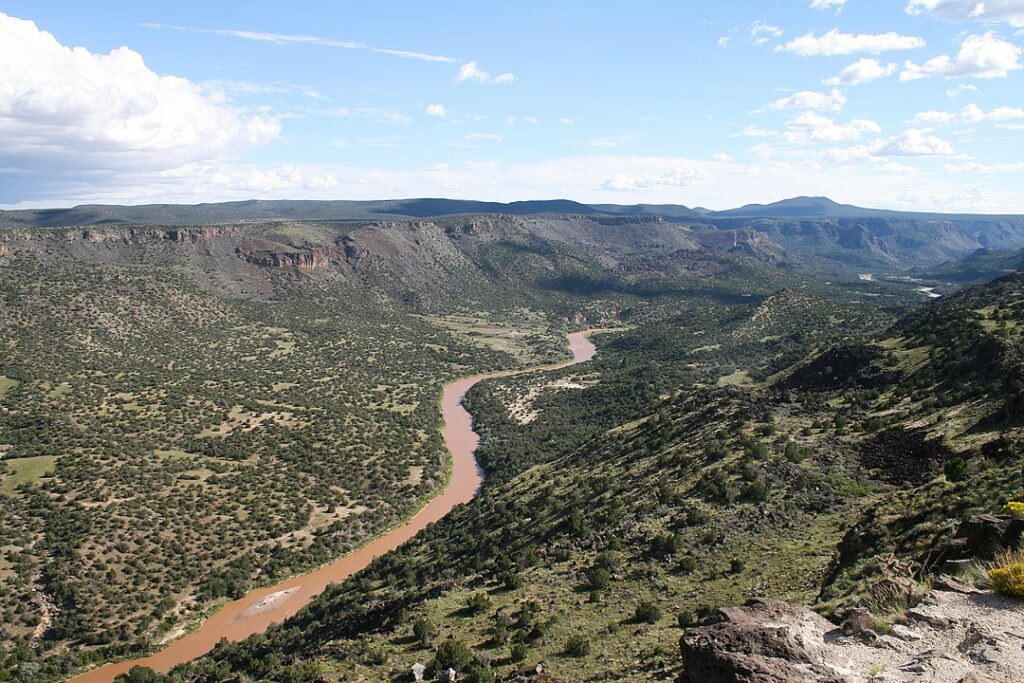Report Says More Action Is Needed To Protect Freshwater Ecosystems
Nov 10, 2023 | Pratirodh Bureau
The Rio Grande in Texas, U.S. (Courtesy of Wikimedia)
The COP28 U.N. climate summit, which begins in just a couple of weeks, aims to make water more of a priority than it was in past COPs, with host country United Arab Emirates saying it will give “unprecedented attention” to risks and opportunities for water conservation. But water was also a major talking point at COP27 and at many climate conferences before that, and it is consistently mentioned in regional treaties on conservation, such as the one passed by Amazonian countries earlier this month. Many environmental groups have said that, despite the constant rhetoric surrounding water, conservation projects still don’t give it enough attention.
- A recent report from the international conservation NGO WWF argues that freshwater ecosystems are too valuable to go overlooked as new conservation policies are created.
- Freshwater underpins global food security, the economy and public health, putting the total value of water in 2021 at around $58 trillion, or 60% of the global GDP, the report estimates.
- WWF urged governments to revitalize efforts to conserve 30% of rivers, lakes and wetlands by 2030 and for the private sector to develop better risk assessments that eliminate pollution from their supply chains and consider how they contribute to water scarcity
“Water, our planet’s lifeblood, and the ecosystems that store and supply it — rivers, lakes, wetlands and aquifers — have been consistently undervalued,” WWF said in a recent report. “This oversight exacts a profound toll: a water crisis that corrodes human well-being and jeopardizes our planet’s health.”
The value of freshwater is hard to understate. Not only is it vital to biodiversity and combatting climate change, but it underpins global food security, the economy and public health. The WWF report estimates that the total value of water in 2021 was around $58 trillion, or 60% of the global GDP. That figure takes into account all the ways that society benefits from water, from consumption to soil fertility to carbon sequestration in swamps.
Nevertheless, freshwater conservation efforts haven’t stopped the world from losing a third of its wetlands in the last 40 years, according to the Secretariat of the Convention on Wetlands. Nor have they stopped rivers, lakes and wetlands from taking on around 80% of wastewater, according to U.N. Water, which coordinates work on water and sanitation.
The twin problems of declining freshwater reserves and pollution is due to a mix of human intervention and climate change, the WWF report said. In the southern U.S. and Mexico, rivers like the Rio Grande have been dammed and diverted to meet the needs of residents and agricultural producers. But the rising temperatures in the region have also led to higher rates of evaporation. By 2050, around 25% of the river’s water could be lost, according to GlobalScan.
Rivers like the Rio Grande also help cool and clean factories, and provide a mode of transport for shipping networks that the global economy relies on.
“Almost every business and industry depends on water — from mining and manufacturing to the operation of enormous data centers that store, process and distribute vast amounts of digital information,” the WWF report said.
In Spain’s Doñana wetlands, industrial agriculture and pollution have put excessive stress on freshwater ecosystems. Last year, the largest lagoon dried up for only the third time in 50 years, according to the country’s Ministry of Science and Innovation.
“Freshwater ecosystems are some of the most imperiled around the world,” said Joel Betts, a county coordinator for the Michigan Agriculture Environmental Assurance program, which aims to reduce farming impacts on freshwater ecosystems. Betts wasn’t involved in the WWF report.
“As human disturbance levels increase — whether it’s from agriculture, mining, overfishing, irrigation — we get closer to tipping points where the ecosystem that’s in place can no longer handle it, and you start to lose species,” he said.
That can also increase public health risks, as a lack of clean drinking water often results in spikes in waterborne diseases like cholera and typhoid, the report said. Freshwater ecosystems also help prevent erosion, mudslides and other natural disasters by keeping the landscape intact.
“Freshwater ecosystems are particularly vulnerable to what happens on the land, and as what happens on the land changes due to human disturbance and climate change, they get pushed passed these thresholds and vulnerable species end up going extinct and you get these shifts in ecosystem types,” Betts said.
The WWF report said the public and private sector need to “wake up” to the water crisis that persists today, and urged them to consider the impact climate change and pollution will have on the global economy, environment and social well-being of billions of people if more isn’t done.
Governments need to reconsider how they include freshwater conservation in the international community’s larger 30×30 initiative, a plan to conserve 30% of the planet’s land and marine habitats by 2030, the WWF report said. That could include improving data collection that leads to better decision-making, improving maintenance of groundwater — including usage and contamination prevention — and investing in the protection of natural water resources like rivers and lakes that are used for storage.
The private sector needs to develop better and more transparent water risk assessments that eliminate pollution from their supply chains and consider how they contribute to water scarcity — such as by becoming more efficient with water use — the report said.
“In recent years, the climate and conservation movements have really opened people’s eyes to the climate and nature crises,” the report said. “It is time to do the same for water — to end the water blindness and blinkered decision making that are driving degradation and slowing solutions.”
(This article has been written by Maxwell Radwin and republished from Mongabay under a Creative Commons licence. Read the original article here)
